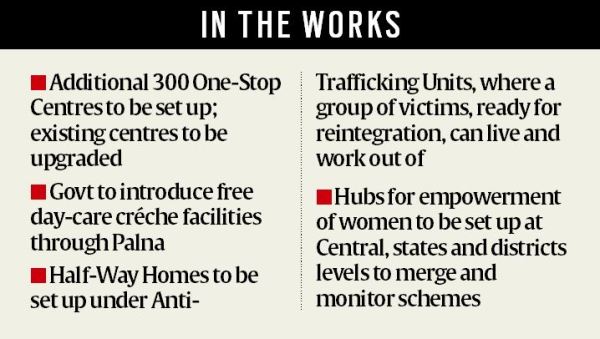Beti Bachao Beti Padhao to be extended to all districts
Beti Bachao Beti Padhao, the Centre’s flagship programme for women’s empowerment, which focuses on education of girl child and improving sex ratio, will now be extended across the country, according to guidelines issued by the Women and Child Development (WCD) Ministry on Thursday.
The programme is operational in 405 districts at present.
The ministry published comprehensive guidelines for Mission Shakti — the guidelines are applicable from April.


“The component will aim for zero-budget advertising and encouraging greater spend on activities that have on-ground impact…for promoting sports among girls, self-defence camps, construction of girls’ toilets, making available sanitary napkin vending machines and sanitary pads, especially in educational institutions, awareness about PC-PNDT Act, etc,” according to the guidelines.
In December, the committee on empowerment of women, chaired by BJP MP from Maharashtra, Dr Heena Vijaykumar Gavit, tabled in Lok Sabha its fifth report on “Empowerment of women through education with special reference to `Beti Bachao Beti Padhao’ scheme’’. It stated that nearly 80 percent funds for the BBBP scheme has been used for advertising, and not on sectoral interventions such as women’s health and education. The committee had said that the scheme’s performance in states has not been “up to the mark’’ and expressed “dismay” at under-utilisation of funds.
According to the guidelines, the ministry has now targeted improvement in the Sex Ratio at Birth (SRB) by 2 points every year, improvement in the percentage of institutional deliveries at 95% or above, 1% increase in 1st Trimester ANC Registration per year, 1% increase in enrolment at secondary education level and skilling of girls and women per year, to check dropout rate among girls at secondary and higher secondary levels and raising awareness about safe menstrual hygiene management.
The scheme will also look at increasing girls’ participation in sports by identifying talent and linking them with appropriate authorities under ‘Khelo India’.
The ministry also plans to strengthen One-Stop Centres (OSCs), set up to help women facing violence, including domestic violence and trafficking, by adding 300 OSCs in districts which either have a high rate of crimes against women or are geographically large, preferably in aspirational districts.
The OSCs will be the mainstay of the ministry at the district level for coordination and convergence with other initiatives under Nirbhaya Fund — such as women’s helplines, Anti-Human Trafficking Units, women’s help desks, and special fast-track courts, District Legal Service Authority, etc.
Women in need, including those affected by violence along with their children — girls of all ages and boys up to 12 years — can take temporary shelter at the OSCs for up to five days. For long-term shelter, arrangements will be made by OSCs in coordination with Shakti Sadan, according to the guidelines.
Newsletter | Click to get the day’s best explainers in your inbox
The toll-free, 24-hour women’s helpline, 181, will be merged with the Emergency Response Support System, and other platforms such as 1098 child line and NALSA, will also be connected to OSCs.
“In future, the endeavour would be to have a single number — 112 — for emergency response and 181 for taking care of all non-emergency and information dissemination services to women, girls and children,’’ the ministry stated. The helpline can also be accessed through text or other forms of messages for those unable to speak due to situational or physical challenges.
The ministry has further introduced a new component — Nari Adalat — for providing women with an alternate grievance redress mechanism to resolve cases of petty nature (harassment, subversion, curtailment of rights or entitlements) at gram panchayat-level, which will be implemented in a phased manner.
In the works
* Additional 300 One-Stop Centres to be set up; existing centres to be upgraded
* Govt to introduce free day-care créche facilities through Palna
* Half-Way Homes to be set up under Anti-Trafficking Units, where a group of victims, ready for reintegration, can live and work out of
* Hubs for empowerment of women to be set up at Central, states and districts levels to merge and monitor schemes



